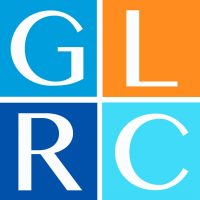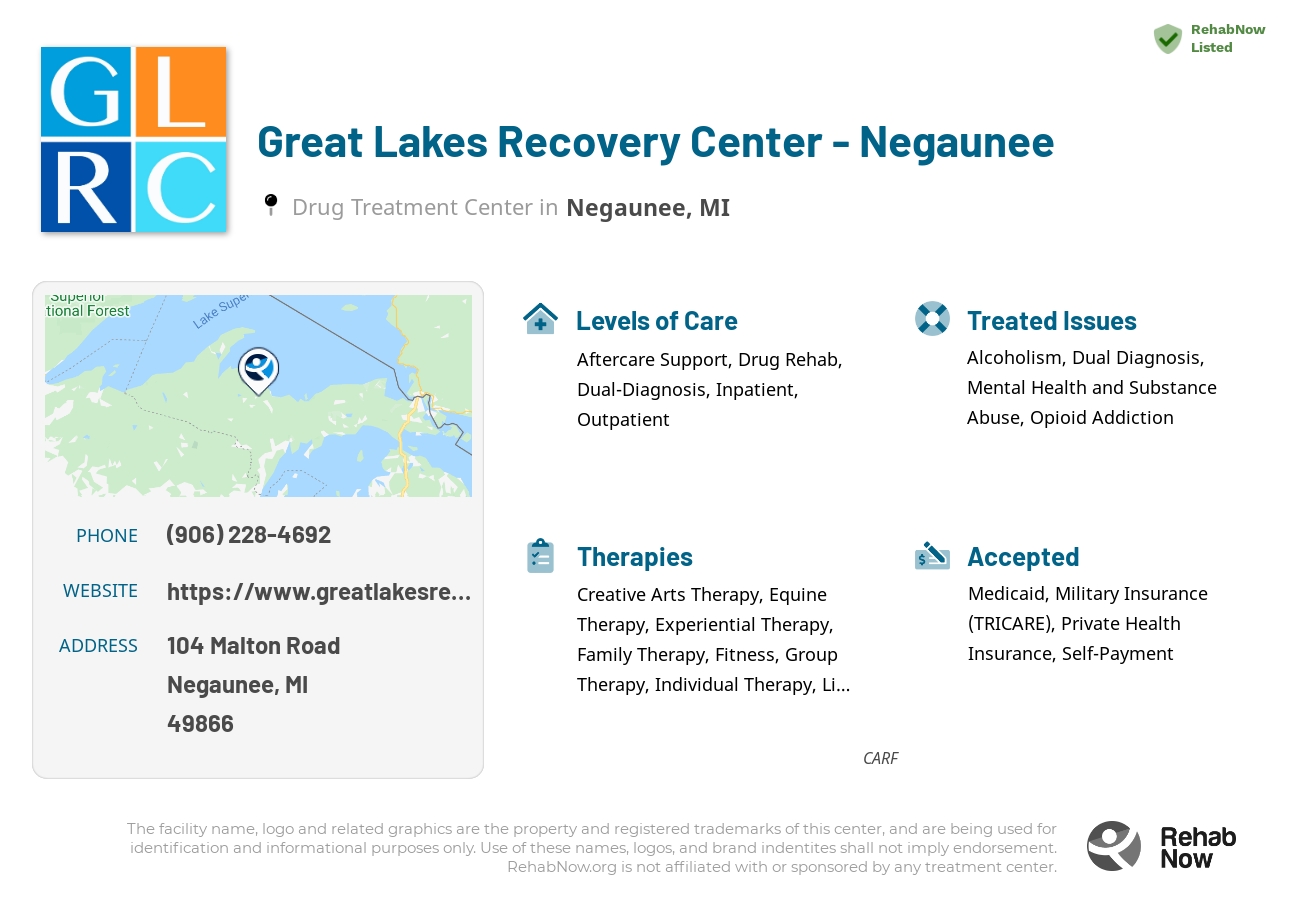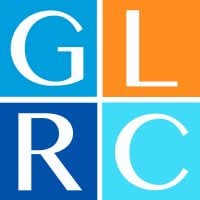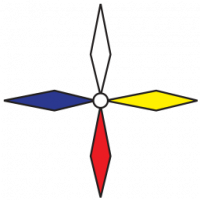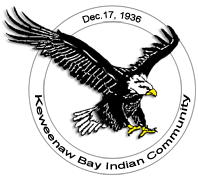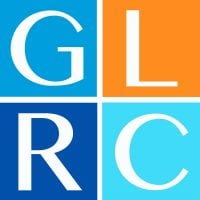Great Lakes Recovery Center - Negaunee
Drug Rehab Center in Negaunee, Michigan
Great Lakes Recovery Center - Negaunee is an accredited substance abuse and addiction treatment center providing a variety of services to individuals with addiction problems including inpatient and outpatient treatment, recovery and aftercare services, individual/group counseling, holistic therapies, medication-assisted treatment, and programs to help maintain sobriety and recovery.
About Great Lakes Recovery Center - Negaunee in Michigan
Great Lakes Recovery Center - Negaunee is an accredited Addiction Treatment Facility located in Negaunee, Michigan. It is dedicated to providing high-quality, comprehensive care to those suffering from Alcoholism, Dual Diagnosis, Opioid Addiction, or Drug Addiction. This 18 bed facility accepts private health insurance and is affiliated with Great Lakes Recovery Centers. It provides Aftercare Support, Drug Rehab, Dual-Diagnosis, Inpatient, and Outpatient Levels of Care.
Great Lakes Recovery Center - Negaunee is accredited by the Commission on Accreditation of Rehabilitation Facilities (CARF) and licensed by the State of Michigan Department of Licensing and Regulatory Affairs. Their Aftercare Support program provides patients with support and guidance once they have completed treatment, while their Drug Rehab program works to identify and address the underlying causes of drug and alcohol addiction. The Dual-Diagnosis program helps to treat co-occurring mental illnesses, and the Inpatient and Outpatient Levels of Care aid in overall recovery. All programs are based in evidence-based practices such as cognitive-behavioral therapy, motivational interviewing, and relapse prevention.
Genders
Ages
Modality
Additional
Accreditations

CARF
The Commission on Accreditation of Rehabilitation Facilities (CARF) is a non-profit organization that specifically accredits rehab organizations. Founded in 1966, CARF's, mission is to help service providers like rehab facilities maintain high standards of care.
Conditions and Issues Treated
Many people who struggle with opioid addiction need to attend specific programs like methadone , Suboxone or Vivitrol clinics.
These types of programs will provide the patient with legal, prescription medications that can help them overcome their cravings for illegal opioids like heroin or fentanyl . If the patient has a chronic condition like Hepatitis C, they must undergo treatment before they can begin taking these medications.
Dual Diagnosis is a specific relationship between two or more disorders that have the same symptoms and can sometimes be treated together. This is used in the treatment planning process when dealing with drug addicts. Dual diagnosis can be viewed as a chronic medical condition that has comorbid psychiatric disorders.
Although addiction and a mental illness may have separate symptoms that are not easy to detect, they often go hand in hand. Many times, drug abuse is a direct result of the mental illness. In other words, treating the addiction will not resolve all of your issues. Unless you also treat the underlying mental illness, you will not be successful in achieving sobriety.
Levels of Care Offered
This center offers a variety of custom treatment tailored to individual recovery. Currently available are Aftercare Support, Drug Rehab, Dual-Diagnosis, Inpatient, Outpatient, with additional therapies available as listed below.
Inpatient treatment is an intensive program that takes place when a patient checks into a rehabilitation facility. The treatment includes detoxification and counseling sessions, which are round the clock. Outpatient treatments are also available, but inpatient care is advised as the first step of rehabilitation.
Intensive rehab ensures the patient stays in a substance-free atmosphere, improving treatment success rates. The patient participates in group therapy for motivation from other patients who have overcome addiction. Family members are also involved in providing emotional support throughout the program.
An outpatient treatment program is set up to help with alcohol or drug addiction, or a co-occurring disorder. The patient must attend the Michigan facility for their therapy and other programs but are able to return home each night. The frequency of mandatory attendance decreases after much of Great Lakes Recovery Center - Negaunee‘s program is complete.
Aftercare is a term that’s used to refer to any sort of continuing care offered for a drug addict who has voluntarily entered a rehabilitation program. This type of care can be provided in several settings, including outpatient therapy sessions after the addict has completed an inpatient program. There are also 12-step support groups, such as Alcoholics Anonymous, which can provide additional help for addicts trying to stay sober.
Therapies & Programs
Individual Therapy is a critical component of addiction recovery. Therapists work with patients to identify the root of their addiction and figure out how to better handle the issues that led to them using drugs. Individual Therapy is the one-on-one session where people meet with their therapist. Individual therapy provides a safe space for people to open up and discuss personal and sensitive topics which they may not feel comfortable discussing in a group setting.
Family therapy will also help families realize that the addiction is not their fault. For many years, people blamed themselves for an addict’s behavior and felt that they had done something wrong. This is not the case. Addiction is a disease, and it can strike anyone, even if their life seems fine from the outside. It can bring a lot of shame to a family when they have an addict in their midst, but if everyone is open and honest with each other, then they can help everyone stay in recovery.
Group Therapy is utilized by drug treatment centers like Great Lakes Recovery Center - Negaunee to provide the recovering drug addict with a platform to talk about their feelings and experiences. It also provides for an opportunity to learn from other addicts who have successfully overcome their addiction.
Group Therapy is employed in lectures, seminars, or discussion groups (the latter two are typically conducted as “therapy groups”). It is recommended that all group members be recovering addicts for this type of therapy to work (though it does not exclude others with lived experience).
Trauma therapy is a clinical process that helps individuals deal with mental stress often caused by traumatic events. It is generally done for children, teenage victims of sexual assault, and war veterans. The therapist helps the person identify, understand and work through the problem. This is done with the help of talking about it in group or one-on-one counseling sessions. Therapists use relaxation, role-playing, art, and music to help the person open up about what is bothering them.
Cognitive behavioral therapy is also a popular service for individuals living with addiction. This type of supportive treatment uses both one-on-one counseling and group sessions to teach addicts how to identify thoughts, behaviors and emotions that might increase their risk of relapse.
These professionals can help addicts develop coping skills for managing stress, improving self-esteem and overcoming triggers. They might also use behavioral therapy to help addicts learn how to avoid cravings and warning signs that could lead them back into addiction.
Therapy can be used as a step-down from inpatient treatment or as the primary method of overcoming an addiction. No matter which option is best for the addict, they will teach important emotional coping techniques, which can make it easier for addicts to get through the tough days.
Training in improved life skills helps those recovering from addiction feel more capable of self-care. Great Lakes Recovery Center - Negaunee are daily skills that give the person the tools they need to survive.
The therapy covers practical activities like cooking, job hunting, social interaction, and money management, helping to fill in the knowledge gaps caused by addiction.
These life skills help the person self-manage their recovery and stay on track. It also reduces relapse risk as they gain confidence in their day-to-day abilities.
Patient Experience
Creative Arts
This type of therapy can help addicts manage anxiety, stress, and other negative feelings. It typically involves the use of art materials to express thoughts and emotions that might otherwise be difficult for an addict to discuss with another person.
During these types of sessions at Great Lakes Recovery Center - Negaunee, addicts will typically work with a therapist or support group leader to create pieces of art. For instance, they might draw pictures, paint, sculpt, and so on. During the process, addicts are encouraged to talk about what led them to substance abuse in the first place.
Experiential Therapy at Great Lakes Recovery Center - Negaunee
Experiential therapy is another form of treatment that helps addicts overcome their addiction. This type of service typically involves hands-on activities with the focus on physical experiences instead of emotions or beliefs.
Some examples include art therapy, equine therapy and music therapy. Each of these forms of experiential therapy can provide unique ways for addicts to channel their feelings and work through their demons. This type of therapy also allows addicts to develop meaningful emotional connections with others, which can prevent them from resorting to relapse as a coping mechanism.
Equine Therapy in Michigan
Equine Therapy is offered by drug rehabs to treat a variety of addictions. A significant part of drug rehab centers that offer Equine Therapy is the farmer’s market effect it provides for patients by caring for and riding horses. The overall goal of Equine therapy is to encourage patients to have hope that they can overcome the challenges they are faced with.
Researchers have found that humans can build trust in each other when they work together with horses. Patients do this by learning how to communicate with the horse through body language to create a bond with it. This process takes time, but eventually, one can understand the horse’s different movements and how they affect the situation.
Fitness Therapy
Fitness therapy is an alternative treatment for drug addiction. Fitness therapists work with addiction counselors to help drug addicts recover from their addictions by incorporating physical fitness into their treatment. Fitness therapy uses both group exercise and individual physical activity to help addicts stay fit while getting sober.
Exercise releases endorphins in the brain, which are “feel-good” chemicals that reduce pain and increase feelings of happiness. Fitness therapy aims to help addicts stay sober by associating exercise with those good feelings. By helping addicts become active, fitness therapy also helps them gain self-esteem and lose weight.
Payment Options Accepted
For specific insurance or payment methods please contact us.
Is your insurance accepted?
Ask an expert, call (888) 674-0062
Great Lakes Recovery Centers Associated Centers
Discover treatment facilities under the same provider.
- Great Lakes Recovery Centers - Adult Residential Services in Marquette, MI
- Great Lakes Recovery Centers - Mountain in Iron Mountain, MI
- Great Lakes Recovery Centers - Men's New Hope House in Sault Sainte Marie, MI
- Great Lakes Recovery Centers - Women's New Hope House in Sault Sainte Marie, MI
- Great Lakes Recovery Centers - Wright street in Marquette, MI
Learn More About Great Lakes Recovery Centers Centers
Additional Details
Specifics, location, and helpful extra information.
Negaunee, Michigan 49866 Phone Number(906) 228-4692 Meta DetailsUpdated November 25, 2023
Staff Verified
Great Lakes Recovery Center - Negaunee Patient Reviews
There are no reviews yet. Be the first one to write one.
Negaunee, Michigan Addiction Information
Michigan has the second-highest rate of drug and alcohol abuse in the nation. Heroin is linked to more than 50% of the state's hepatitis C cases. Marijuana is the drug most often associated with crimes in Michigan, followed by methamphetamines. Opioids alone are responsible for almost 20% of all drug overdose deaths in Michigan.
Treatment in Nearby Cities
- Clarkston, MI (333.8 mi.)
- Chelsea, MI (340.7 mi.)
- Jonesville, MI (346.0 mi.)
- Pigeon, MI (282.6 mi.)
- Imlay City, MI (329.2 mi.)
Centers near Great Lakes Recovery Center - Negaunee
The facility name, logo and brand are the property and registered trademarks of Great Lakes Recovery Center - Negaunee, and are being used for identification and informational purposes only. Use of these names, logos and brands shall not imply endorsement. RehabNow.org is not affiliated with or sponsored by Great Lakes Recovery Center - Negaunee.
